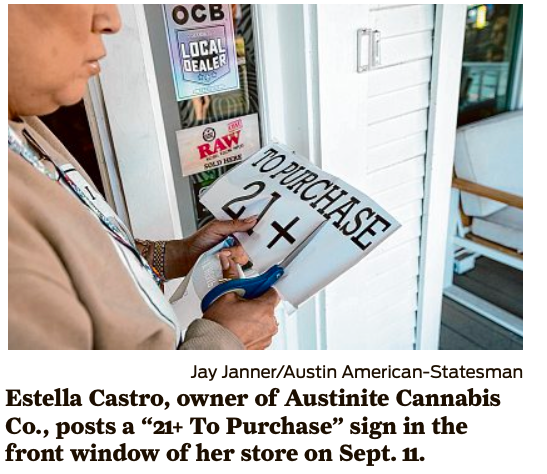Warnings and serving sizes don’t fix the loophole — they normalize THC products and expand youth access. By Matt Rossheim, Guest columnist Oct 2, 2025
When the ancient Greeks rolled a giant wooden horse to the gates of Troy, the Trojans believed it was a peace offering. We all know how that ended.
Texas now faces its own Trojan horse: Gov. Greg Abbott’s recent executive order on intoxicants made from hemp.
At first glance, the order seems to protect children. It tells state agencies to set serving sizes, require health warnings and prohibit sales to those under 21. Who could oppose that?
Look inside the horse.
Instead of real safeguards, the order entrenches Texas as one of the nation’s most wide-open, de-facto recreational markets.
Before issuing this order, Abbott vetoed Senate Bill 3 — a bipartisan measure that would have closed the very loopholes now being cemented. The executive order doesn’t fix the problem — it reverses course.
Research from states that legalized marijuana shows a clear pattern. Greater access leads to more use among young adults, more cannabis-related hospitalizations, and more impaired driving. When products appear regulated, young people see less risk and experiment more.
Publishing serving sizes and warnings doesn’t crack down; it normalizes use and gives a false sense that these products are government-approved and safe.
Age limits don’t keep kids safe. About 17% of Texas high schoolers and 10% of middle schoolers report ever using e-cigarettes. About 546,000 Texans ages 12-20 — 14% of that age group — drank alcohol in the past month despite minimum-age laws. Parents can’t watch their children every second, and fake IDs that fool electronic scanners are cheap and easy to get online.
Hopefully no retailers were selling intoxicants to toddlers, yet THC-related calls to Texas poison control centers for 0- to 5-year-olds climbed 12-fold in just the past six years. Legitimizing the sale of THC products will only expand access, and more children will inevitably be poisoned.
Worse, the order ignores the chemical reality of the market. Hemp-derived CBD can be turned into potent THC look-alikes that have sent children and adults to emergency rooms. Federal agencies have warned of these dangers, yet the order doesn’t even mention them.
This is the Trojan horse. It arrives dressed as “child protection,” but hidden inside is a plan to legitimize recreational THC with only token safeguards.
The order isn’t about child safety; it effectively ensures access to deceptively marketed intoxicants that federal regulators warn are illegal and can harm consumers.
Lawmakers in Austin and Washington must fix the bigger problem: redefine “hemp” to exclude all intoxicating cannabinoids. Without that change, clever marketers will keep exploiting legal language and chemical workarounds that endanger consumers — especially young people.
Until lawmakers close these loopholes, any temporary safeguards are mere band-aids. Regulators can try to slow the damage, but no amount of serving size or warning labels will solve the core problem. Only redefining hemp to exclude intoxicating cannabinoids can.
Texans shouldn’t mistake this wooden horse for a gift. Inside are the architects of today’s intoxicating-cannabinoid market: multimillion-dollar manufacturers, aggressive national distributors, and the lobbyists and lawyers who shield them.
They’re pushing marijuana disguised as “hemp,” hazardous intoxicants as “wellness,” and brightly packaged gummies as “not for kids.” Under the banner of “child protections,” they are quietly legitimizing dangerous products for profit at the expense of Texas families.
Matt Rossheim is a public health professor, substance use prevention researcher, and parent in Fort Worth.
Originally published on Austin American-Statesman https://www.statesman.com/opinion/columns/your-voice/article/opinion-abbott-s-child-safety-order-hides-21067307.php
